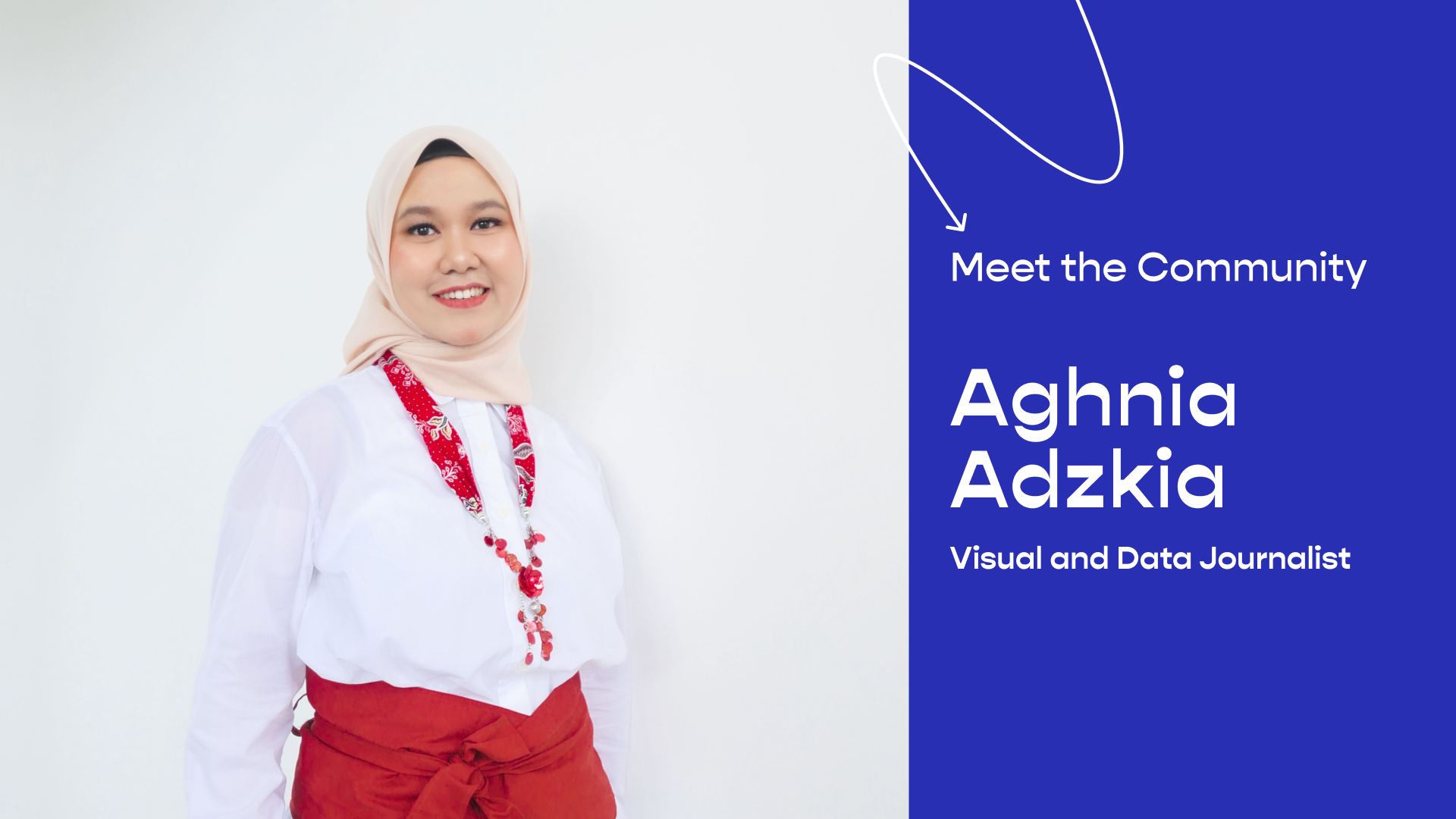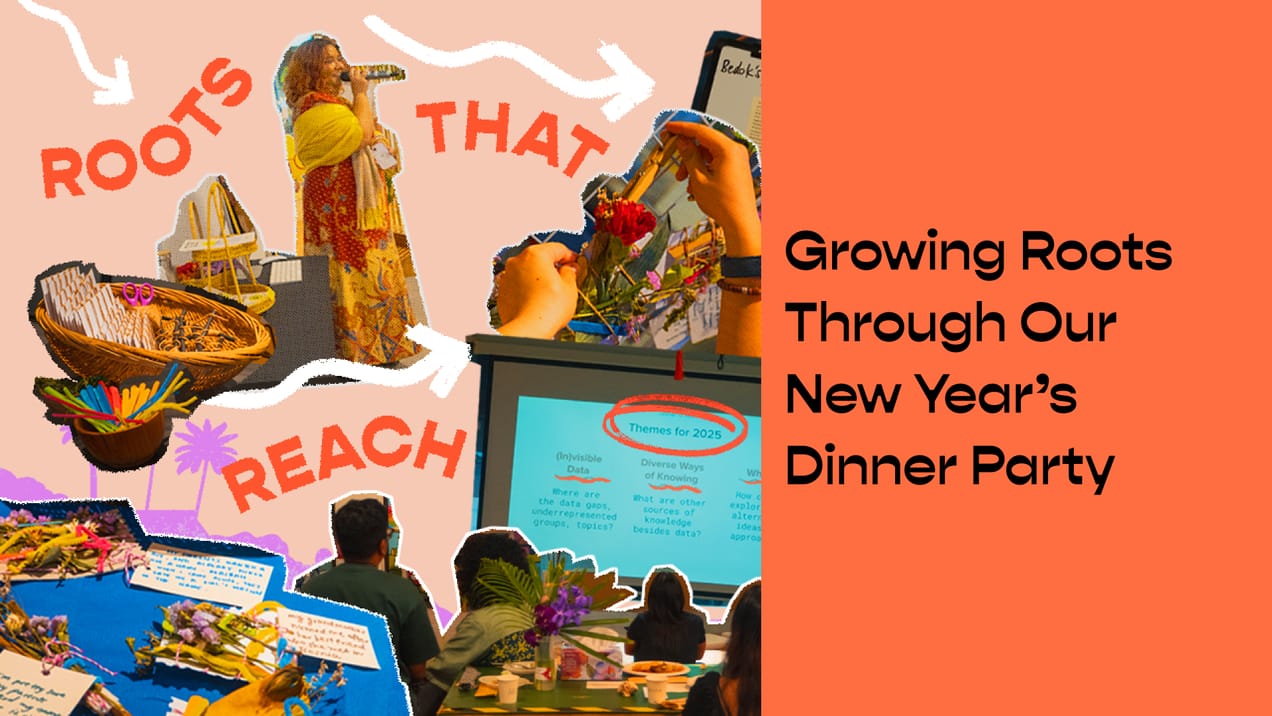
Meet the Community: Aghnia Adzkia
First of all, I want to ask—how and why did you make the decision to incorporate more data into your usual journalistic practice?
Data can strengthen the argument within a story. When you say something with data, it becomes more powerful, [especially in] this era of misinformation, where you really need to fight back against misconceptions with data. It definitely plays a more significant role in the news nowadays, compared to maybe 10 or 20 years ago.
Before working as a journalist, I worked in a research position at an international NGO. My undergraduate degree was in journalism. These two fields became one and turned into a huge passion for me. Because of this passion, I went to study in [Goldsmiths, University of London], and did my Master’s in data journalism from 2016 to 2017.
When I came back to Indonesia, it wasn’t that popular to be a data journalist. I emailed more than five editors in prominent Indonesian magazines, daily papers, and online publications, and no one got back to me. Finally, one publication, Beritagar.id, emailed me back and took me in. The publication eventually closed down because of financial issues, but they truly were one of the pioneers in Indonesia in terms of data journalism.
You mentioned that you took up a Master’s programme to further strengthen and sharpen your skill set in data journalism. How was the process and experience of going abroad to pursue this passion of yours and equipping yourself with these skills like for you?
I started coding and learning HTML when I was 15 years old. I loved blogging back then, and I often tried to tweak or hack the frontend code. When I saw the curriculum at Goldsmiths, that memory came back to me. Back in 2016, I wasn’t as good at coding anymore [compared to when I was younger] so I had to take one-month-long courses before flying to London, in order to at least have basic knowledge in coding or programming languages. I thought that would be more than enough preparation before studying my Master’s, but when I finally started the programme, it was such a big shock. It was so hard!
Thankfully, I had two friends who were good in programming, so I often contacted them whenever I faced difficulties. I also joined a group called Journocoders in London to get to know what data journalists or programmers, as well as software engineers, did in their work. I picked up a lot with regards to self-learning and being part of a community, and even participated in several hackathons.
You’re known for bringing Journocoders to Indonesia, so I wanted to talk to you about that. What were the challenges you faced when you brought this community to your country?
Nobody wanted to be a volunteer at first—they would ask, “What is the community about? What does that mean? Why put together [the words] ‘journo’ and ‘coders’?” People were hesitant to join and I remember only a few people came to our initial meetings and workshops. Some of them weren’t even journalists—most of our audience consisted of data scientists or enthusiasts.
In 2018, data journalism itself was not that popular in Indonesia. Now, everyone talks about it because of COVID and it’s such a big opportunity for us to elevate our journalism skills and the quality of our publications.
Could you expound a bit more on how COVID changed data journalism’s image in Indonesia?
Lots of publications started to use graphics and show data about COVID on their front page, and regularly updated statistics. Everyone wanted to learn more about our local situation regarding this health crisis—what was the death toll? How many people got infected? It was only then that people realised how important and valuable such data truly were.
How do you and your team usually conduct your monthly workshops at Journocoders? What do you usually discuss and how do you design your curriculum?
We’ve been off for about six months now in terms of our workshops, but we’ve done a lot of non-community speaking events recently, for organisations that invited us to train them in data journalism. Over the last year, we also held a Data Journalism Conference in Indonesia, where I helped design the programme, workshops, seminars, and training sessions. Journocoders was one of the main collaborators and a lot of our members took part in the conference. And in the week after that, we had our most recent meet-up as a community, which was a practice session on interactive storytelling using Twine. We also did a workshop in July and will be holding a discussion panel about the future of data journalism in August.
As for our curriculum, we asked our members in our Whatsapp group for their opinions—there are about 100 of them in there. They brought up map journalism, Python, and R, and once we understood what they wanted to learn, we provided the speakers. Within Journocoders, we have lots of experts across multiple fields, so it’s more about sourcing the people who want to share their knowlege [about a specific topic].
How does a day in your life look like as a data journalist, especially working in an international newsroom like BBC? Could you compare your experience now with BBC to your past experiences with working under local publications?
To be honest, I’m still learning. When I was in a local newsroom, I only needed to know about current news in Indonesia. But now, I need to know what goes on in the region, which can be very hard. In the morning, I go to other publications like South China Morning Post (SCMP), Nikkei, or Kompas to look at the topics they’re discussing. I also look into their more in-depth stories to observe any trends in data journalism. I often look at Reuters Graphics’ data journalism pieces or SCMP’s stories because they are really great. I like to see what we can adapt from them and bring to the team.
Bouncing off what you said, how would you describe your newsroom’s specific style?
Hard to say! How do I even begin? At BBC, we’re very big on accessibility and inclusion. For example, when it comes to our colour palette, we’re only allowed to use a specific range that is accessible for people with disabilities. Those with colour blindness can’t really differentiate greys, blacks, and whites, so we balance out the contrast and tone. We also try our best to be neutral in our [colour] choices—right now, I’m doing Thailand election graphics, so we need to use colors that are not associated with any political party. Otherwise, people would think we’re supporting or affiliated with a specific candidate. These small things are really important for BBC.
Data journalism is often regarded as a scary and intimidating field. How do you approach topics to make them accessible or even fun to beginners?
I have a really skilled colleague from BBC India whom I like to use as an example for this. He’s really good at R programming and did a workshop at the data journalism conference. He compared writing an R script to making a list of instructions to create the perfect sandwich. If you only wrote “Put the patty inside the sandwich” without specifying that you also have to “Fry the patty before you put it inside the sandwich”, it won’t work. What he means is, if what you put into R isn’t detailed enough, the script won’t work. It was very interesting and easy to digest! I think finding a way to connect something as abstract as that to our daily lives is key.
Do you have any memorable moments from any Journocoders session that stuck with you or continues to inspire you? Something a student said or a volunteer realised?
Out of nowhere, I emailed one person: Christina Anagnostopoulos. She’s from the Reuters verification team and she’s really good at fact-checking. She has done a lot of work regarding the US elections, which I was very interested in, because I kept thinking about how it could be a good example for us, the way fact-checkers debunked disinformation during such a crucial time.
Of course, I couldn’t help but think, “Who am I, writing this email and inviting Christina to talk about her work in a completely different timezone? Would people care about her work?” But she agreed, and was even [alright with doing her talk for free]. Imagine, she’s a [big deal who gets] invited to a lot of data journalism workshops and conferences, and she agreed to do that! A lot of people attended and were really interested in what she had to say. I got a lot of questions, which led to a very active discussion, and I was so happy.
To you, what makes your work at Journocoders worth it?
In the beginning, I didn’t think much about what I could get in return. Journocoders in London helped me learn a lot of things in coding, get to know other professionals doing the same things, and broadened my network and skillset. I simply wanted to do the same in Jakarta and share the knowledge I was fortunate enough to have gained with people in Indonesia.
I remember when I talked to a prominent data journalist from The Guardian and told her I wanted to spread the “data journalism virus” in Indonesia. When I returned to Jakarta, I began to build this community. Fast forward to two or three years later, people started to know me and recognise my work, and I was invited to lots of workshops and training sessions.
One of the really prominent publications in Indonesia invited me to be a trainer and I’ve been teaching their team for seven years. Now, they have a really dedicated team which focuses on data and investigative [journalism]. It’s such a huge achievement for me to witness the progress they’ve made from 2017 to 2023, and [I’m happy] that I got to be a part of that.
What do you think are some of the biggest challenges data journalists will face and how do you think you all can overcome it together?
Technology is growing really fast. If we don’t catch up with all these new tools and equip [ourselves] with the knowledge on how to use them, we will be swamped and become outdated. Learning is really hard though, especially when you have deadlines [at work]. But it’ll be great if one person learns something new and shares it with other people, and someone else does the same. Instead of one person learning [everything] without sharing with [or consulting] others, which will drain them of time and resources, we should overcome this challenge as a community.


